Find more information in the General Comments section of the assessment
Find more information in the Rating Validity tab of the assessment
- See More
- See More
- See More
- See More
- Good
- Adequate
- Marginal
- Weak
- Poor
 Passenger
Passenger
 Driver
Driver
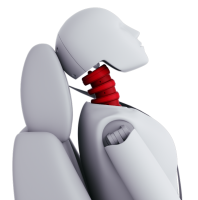 Rear Seat
Rear Seat
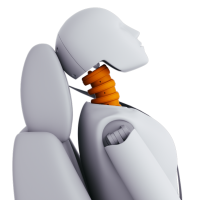 Front Seat
Front Seat
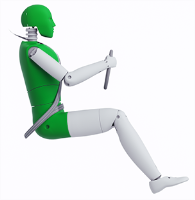 Car
Car
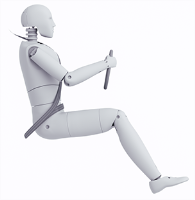 Pole
Pole
- Good
- Adequate
- Marginal
- Weak
- Poor
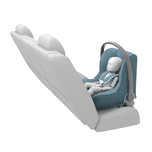
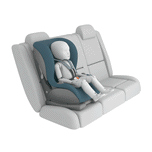
Passenger
outboard
center
Fitted to the vehicle as standard
Not fitted to the test vehicle but available as option
Not Available
Maximum points were scored in the dynamic tests for its protection of the 3 year and 18 month dummies. In the frontal impact, forward movement of the 3 year dummy, sat in a forward-facing restraint, was not excessive. In the side impact, both dummies were properly contained by the protective shells of their restraints, minimising the likelihood of head contact with parts of the vehicle interior. The test vehicle was not equipped with the optional passenger airbag but, where it is fitted, this can be disabled by means of a switch to allow a rearward-facing child restraint to be used in front passenger seat. Clear information is provided to the driver regarding the status of the airbag and the system was rewarded.
- Good
- Adequate
- Marginal
- Weak
- Poor
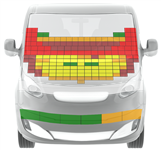
Head Impact 10.2 Pts
Pelvis Impact 0.0 Pts
Leg Impact 5.9 Pts
The bumper provided good protection to pedestrians' legs in some areas but was marginal in others. Tests against the front edge of the bonnet are not performed for vehicles in this size category. The bonnet surface provided predominantly adequate protection to the head of a struck pedestrian with weak or poor results recorded primarily at the stiff bonnet edges and windscreen pillars.
- Good
- Adequate
- Marginal
- Weak
- Poor
| System Name | ESP | |
| Performance | ||
| Vehicle Yaw Rate @ COS + 1.00 s | 1.42% | meets ECE requirements |
| Vehicle Yaw Rate @ COS + 1.75 s | 1.53% | meets ECE requirements |
| Lateral Displacement @ BOS + 1.07 s | 2.35 m | meets ECE requirements |
| Applies To | Driver's seat | ||
| Warning | Driver Seat | Front Passenger(s) | Rear Passenger(s) |
| Visual | |||
| Audible | |||
|
|||
Electronic stability control is standard equipment. A seatbelt reminder is available only for the driver's seat. A speed limitation device is standard on passenger vans but, as it is only an option on the cargo-carrying variants, it was not included in the assessment.
- Specifications
- Safety Equipment
- Videos
- Rating Validity
Specifications
Tested Model Renault Trafic dCi 115 Combi, LHD
Body Type - 8/9 seat van
Year Of Publication 2015
Kerb Weight 2215kg
VIN From Which Rating Applies - all Vivaros of the specification tested
Class Business and Family Van
Safety Equipment
Note: Other equipment may be available on the vehicle but was not considered in the test year.
Fitted to the vehicle as standard
Fitted to the vehicle as option
Not fitted to the test vehicle but available as option
Not Available
Not Applicable
Videos
Rating Validity




Find more information in the General Comments section of the assessment
Euro NCAP determined that the Opel Vivaro is identical to the Renault Trafic in all ways related to safety, including the equipment level. Accordingly, the results of the Trafic are reproduced here for the Vivaro and the rating applies to both vehicles.
 Share
Share
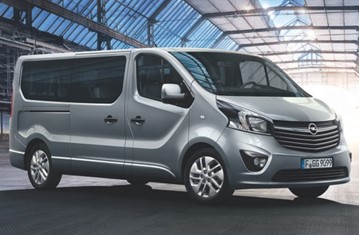
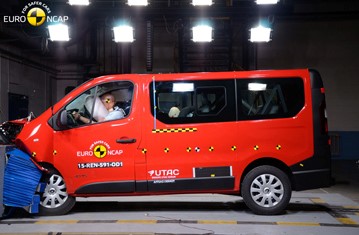

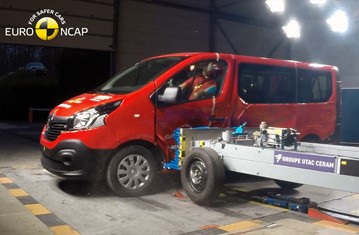




The Vivaro is identical to the Renault Trafic and has the same safety equipment. The rating for the Vivaro is based on tests performed on the Trafic.
The passenger compartment remained stable in the frontal impact. An airbag for the front seat passenger is standard on passenger-carrying versions but, as it is an only an option on the cargo versions, it was not included in the test. Dummy readings indicated marginal protection of the passenger's chest and the steering column and parts of the facia presented a risk of injury to the knees and femurs of both front seat occupants. Maximum points were scored in the side barrier test with good protection of all body regions. A head/thorax airbag is available as an option but, as it is not standard equipment, the vehicle did not qualify for a side pole impact. A geometric assessment of the seats indicated marginal protection against whiplash injury in the front seats and poor protection in the rear seats.